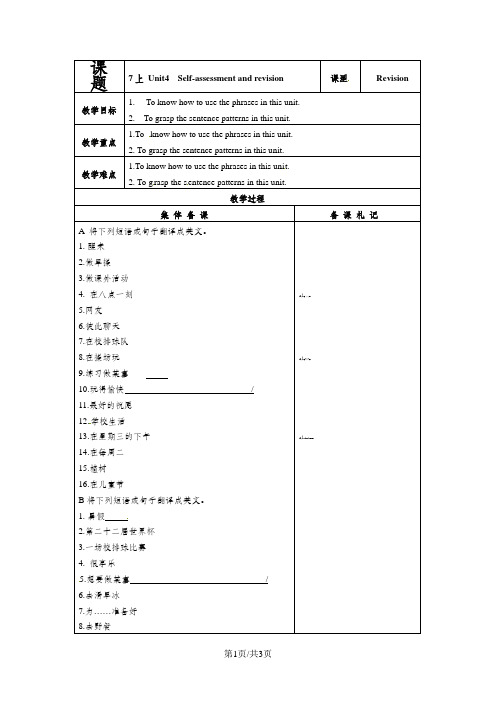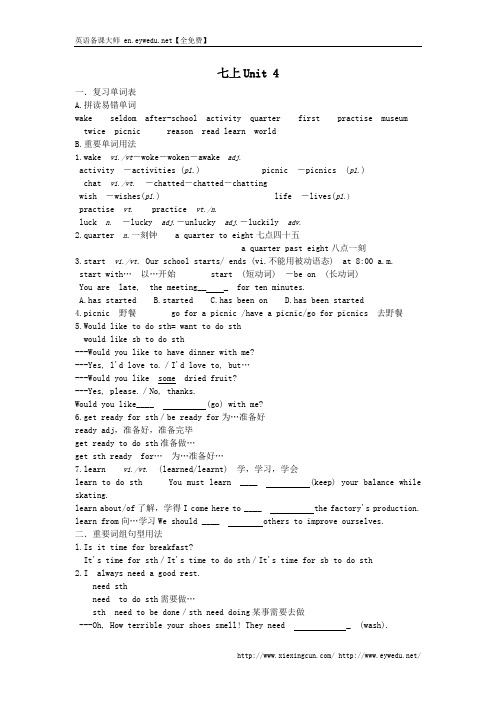七年级英语牛津译林版上册复习导学案:Unit 4 Revision
- 格式:doc
- 大小:48.00 KB
- 文档页数:3

课题7上Unit 4 Reading (1) 课型New教学目标1. To identify specific information about school life and activities;2. To practice reading skills by learning Millie’s article;3.To learn the new words and expressions.教学重点1. To identify specific information about s chool life and activities;2. To practice reading skills by learning Millie’s article;教学难点To practice reading skills by learnin g Millie’s article教学过程集体备课备课札记Step 1. Checking of preview workStep 2. Revision1. Revise Millie’s day.2. Ask the students to talk about “My day”Step 3. Presentation1. Lead in--get the students to know the new words andphrases2. Listen to the tape and try to answer the questions.3. Listen and read, try to say which sentence is right andwhich one is wrong.Step4. Reading1. Read the passage and try to answer the questions.Who writes the e-mail? Who does she write to?What is the e-m ail about?2. Do some T or F questions.3. Read the text and find out the main ideas: introduc eherself and school about her class and friends/about thelessons/about the after-school activitiesStep 5. Retail the text with some key words or phrases.Step 6. Fill in the blanks.Millie is at Beijing Sunshine Secondary School. She is ____Class 1, Grade 7. She likes her classroom because it’s bigand ______.Amy is Millie’s _____friend. And they like ______ under the trees _____ _________. They always chat _____ ______or play______.Every morning they ____ ______ ________ first. Millie’s ________ lessons are Chinese and English, Every day Millie _______2 hours______ her homework.Every Tuesday and Friday Millie goes the ______ _____. She sometimes _____ volleyball _____ Amy. Amy is a good ________. We have a good time at school.Step 7. DiscussionDiscuss their school life in groupsStep 8. SummeryStep9. ExercisesDo some exerci ses and check them in clas s.Step10. Homework板书设计Unit4 Reading1. 我们学校的一天从八点开始。

课题7上Unit4 Self-assessment and revision 课型Revision教学目标1.To know how to use the phrases in this unit.2. To grasp the sentence patterns in this unit.教学重点1.To know how to use the phrases in this unit.2. To grasp the sentence patterns in this unit.教学难点1.To know how to use the phrases in this unit.2. To g rasp the s entence patterns in this unit.教学过程集体备课备课札记A 将下列短语或句子翻译成英文。
1.醒来2.做早操3.做课外活动4. 在八点一刻5.网友6.彼此聊天7.在校排球队8.在操场玩9.练习做某事____ _____________10.玩得愉快/11.最好的祝愿12.学校生活13.在星期三的下午14.在每周二______________________15.植树16.在儿童节B将下列短语或句子翻译成英文。
1.暑假2.第二十二届世界杯3.一场校排球比赛4. 很享乐5.想要做某事/6.去滑旱冰7.为……准备好8.去野餐[来源学_科_网] [来源学+科+网] [来源:Z&xx&]9.一个月两次____ _______ _ ___10.迟到11.舞蹈课12.在上午/下午/晚上//13.吃早饭/中饭/晚饭//14.对世界了解很多C用介词in,on,at 填空。
1. I usually do homework ________7:00 p.m.2. She likes swimming_________ summer.3. _______Christmas,childr en usually get many presents.4. In China,the summer holiday comes ________July.[来源:Z,xx,]5. We will go to Nanjing _________Sunday.6. We have a party ________ the evening of December31st.7. ________Ch ildren’s Day,we usually have a good time.8. Teachers’ Day is________ September 10th.9. We often read English_________ the morning.10. He was born________May,201911. He comes back___________ Wednesday afternoon.12. The leaves turn yellow________ Autumn.13. Children in China st art school _________6 years old.14. We plant trees _______March every year.15. Do you like watching TV_______ the evening?板书设计。

七上Unit 4一.复习单词表A.拼读易错单词wake seldom after-school activity quarter first practise museum twice picnic reason read learn worldB.重要单词用法1.wake vi./vt-woke-woken-awake adj.activity -activities (pl.) picnic -picnics (pl.)chat vi./vt.-chatted-chatted-chattingwish -wishes(pl.) life -lives(pl.)practise vt.practice vt./n.luck n.-lucky adj.-unlucky adj.-luckily adv.2.quarter n.一刻钟 a quarter to eight七点四十五a quarter past eight八点一刻3.start vi./vt. Our school starts/ ends (vi.不能用被动语态) at 8:00 a.m.start with…以…开始start (短动词) -be on (长动词)You are late, the meeting__ _ for ten minutes.A.has startedB.startedC.has been onD.has been started4.picnic 野餐go for a picnic /have a picnic/go for picnics 去野餐5.Would like to do sth= want to do sthwould like sb to do sth---Would you like to have dinner with me?---Yes, l'd love to./I'd love to, but…---Would you like some dried fruit?---Yes, please./No, thanks.Would you like____ (go) with me?6.get ready for sth/be ready for为…准备好ready adj,准备好,准备完毕get ready to do sth准备做…get sth ready for…为…准备好…7.learn vi./vt.(learned/learnt) 学,学习,学会learn to do sth You must learn ____ (keep) your balance while skating.learn about/of了解,学得I come here to ____ the factory's production. learn from向…学习We should ____ others to improve ourselves.二.重要词组句型用法l.Is it time for breakfast?It's time for sth/It's time to do sth/It's time for sb to do sth2.I always need a good rest.need sthneed to do sth需要做…sth need to be done/sth need doing某事需要去做---Oh, How terrible your shoes smell! They need _ (wash).---Ok,mum, but l need (finish) my homework first.3.Some dogs just don't know how to have fun.特殊疑问词+不定式作宾语have fun /have a good time /enjoy oneself doing sth很高兴做某事good time they have climbing the mountain!A.WhatB.What aC.HowD.How afun they had flying the kites!A. What a greatB.How a greatC.What greatD.How great4.do morning exercises做早操do eye exercises做眼保健操do English exercises做英语练习do /take some exercise锻炼5.We practise after school on Wednesday aftemoon.practise doing sthThe boys often practises____(paint) after school.6.I'm never late for it.It's too____(晚的)to go now. He comes__ __(晚的)later adv.稍后的,较晚的,较后的two months later Try again later!latest adj.最新的,最近的This is the (最新的)news.7.Sandy doesn't have much time to play tennishave no/enough /much/a lot of time to do sthhave time for sthMy parents always have no time____(have) dinner with me.8.My favourite subject is English.=I like English best.one's favourite…/one's own…my father’s own computer9.Thanks for your email.= Thank you for your email.thank sb for sth /doing sthThanks for____(invite) me to have dinner.10.I would like to tell you about my life here.tell(讲,告诉)sb about sth /tell sb sth /tell sth to sbtell(吩咐,命令)sb (not) to do sthHe told me __ __ ( not drive) too fast.tell(讲述,说出)stories/jokes/ lies/ the truthtell difference(s)辨别( )Who did you____about the secret?( )What did your father____about the parents' meeting?A.sayB.tellC.speakD.talk11.1 hope everyone can come and watch the game.hope vi./vt.-hopeful adj.-hopeless adj.hope to do sth hope+that从句(将来时)It is hoped that…人们希望…The children hope__ __ (do) something for the old man.I hope you__ __ (come) to my party tomorrowIt is__ __(hope) that people could start all over again, and build a better world.注:没有hope sb to do sth这种用法12.Wish our team good luck.good luck to sb /good luck with sth good luck to sb with sthGood luck you your exam!13.They are good for us他们对我们有好处be good for对…有益Exercise____(be) good for us.be good at/doing sth=do well in sth/doing sth擅长…The grandma is good at____(cook) fish.be good /nice kind /friendly to sb对某人友好14.We always have too much homework.我们总是有太多的家庭作业。

课题教课目的教课要点教课难点7 上 Unit 4Integrated skills课型New1.To get useful information about a volleyball match from the listening material;[根源 :1ZXXK]2.To c omplete a notice about the match with the useful information they;’ ve got3.To talk about their weekend activities.1.To get useful information about a volleyball match from the listening material;2.To complete a notice about the match with the useful information they ’ ve got;To talk about their weekend activities.教课过程集体备课备课札记Task 1. Lead-in1.New words a nd phrases about ball matches.2.Ask and answerWhat do you like to do at weekends?Do you like to watch all kinds of ball matches?Which ball team do you like best?W ho is your favourite ball player? [根源:1ZXXK] Task 2. Listening1.Listen to the tape a nd choose the right answer on page 49.Then complete Simon ’ s notes w ith these choices.2.Listen again and fill in blanks on page 50. Then check the answersTask 3. Reading1.Read the notes togethernguage points Betweenand . / +cn. (pl)Go there/ here/ home good luck (lucky)Hope to do sthhope sb will/ can do sth [根源:1]Task 4. Speak up1. Ask and answerWhere do you like to go at the weekend?How often do you go there?Wha t about you?2.Read the conversation on page 503.Practise these three sentences4.Make a new conversation like this one on page 50.5.Show timeTask 5. Homework. [根源学。

课题7上Unit 4 Study skills 课型N ew1. To know how to pronounce the vowels in stressed open syllables;教学目标2. To read the new words and expressions with vowels correctly.教学重点To know how to pronounce the vowels in stressed open syllables;教学难点To read the new words and expressions with vowels correctly.教学过程集体备课备课札记Step 1. Checking of preview work1. Check their preview work2. Solve questions they found about their preview workStep 2. RevisionReview the sounds on page 39 and give Ss more words topractice.Step 3. PresentationPresent some English names that concluded the phoneticsymbols in this lesson and learn the vowels.Step 4. Lis ten and practice1.Let them listen to the tape and read the vowels.2.Present the wo rds that has the same phonetic symbol andask the Ss t o make up sentences by themselves.3.Do a tongue twister practice, and ask girls to competewith the boys.4.Present a poem with some blanks at the end of theline.Ask the Ss to try to fill in the blanks to complete thepoem. After that, read the poem together.5. Practice saying Part B&C on P51. Step 5. ExercisesFinish the exercisesCheck the answers if time is enough. Step 6.Homework板书设计7上Unit 4 Study skills找出划线部分读音不同的选项1. ( ) A. bread B. meat C. ready D. heavy2. ( ) A. food B. good C. cool D. moon3. ( ) A. horse B. short C. sport D. work4. ( ) A. arm B. warm C. car D. st ar5. ( ) A. after B. bird C. father D. dinner教学反思。

牛津译林版七年级英语上册Unit 4 task Period 9教案一. Teaching Contents. task Your favourite activities二. Teaching Aims.Grasp words:world, difficult, partreason, readyPhrases:1. be good for sb2.help sb do3.get ready for4. chat with sb5. learn more about6. some parts of the daySentences:1. It’s hard for me2. I like some parts of the day3. They help us get ready for the day.4. It is too difficult and we have too much三. Teaching tasks:1.To plan before writing an e-mail.2.To write about likes and dislikes for an audience.四. Teaching focus: To train students' ability of writing.五. Important and difficult points1. To tell like/dislike and their reasons2. To write and e-mail about activities orderly六. Steps(一) Preparation1. Check the phrases.(预习作业)(学生上黑板展示答案,强调较难的)2. Please tell some English names of activities(Have a competition, who can say the most and give a littlereward)3. Answer questions(Millie's happiness chart)(二) Revision1.Revise Millie's day on Reading part2. Free talk(1) Do you like watching TV?(2) Do he/she like listening to music?(3) What is his/her/ favourite activity?(可采用接力形式,让学生问另一个,培养学生口语表达能力)(三) Lead--in1. Introduce the idea of a happiness chart.2. Young people want to find out what other students love, likeand dislike about different activitiesEg: ** loves playing computer games, likes reading, butdislikes playing football.3.Part A .Look at "Millie's happiness chart" and learn aboutwhat she loves, likes and dislikes.(学生自读, 可看插图中的脸型, 然后给出答案)4.Read the sentences in "Reason".(四) Discussion1.What does she love/like/dislike?2.And why does she love/like/dislike that ?(就预习作业三, 四人一组, 一人问其余三人答, 并轮流问答, 从中挑选2组展示)(五) Practice1. Draw "My happiness chart". Use PartA as a model.2. Complete the table in Part C (同桌间交流个人活动喜好,并说明理由)3. Work in pairs to discuss the reasons why they like or dislikecertain activities.4. Finish the e-mailUse the information in the table to complete the e-mail.(中等学生展示e-mail, 给出相应评价)5. Read the e-mail twice(六) Check完成学案中当堂检测题(有重点的当堂讲评, 同桌相互批改)(七) Homework1. Write your e-mail into the homework book2. Finish the prepartion of next period(八) teaching reflection学案课题7A Unit4 My day Task学习目标知识目标总结本单元谈到的各种活动。